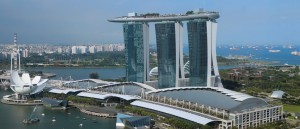In 2017, being a “smart city” isn’t just about having fast internet.
Officials around the world are gathering all types of data — on traffic, pollution levels, and energy use — to make their cities safer, healthier, and more efficient. The definition of a smart city has recently broadened to include environmental sustainability, affordable and reliable transit, access to education, and a local economy with businesses that explore new technologies.
Although it sounds promising to make our cities smarter, however, some ethicists worry that as technology progresses, it will become harder for citizens to maintain privacy.
Concerns aside, EasyPark Group, a startup that tracks city parking data, has come out with its 2017 Smart Cities Index, which explores which cities are the most prepared for the future.
“We discovered that such a city should be digitalized first and foremost — with 4G, plentiful Wi-Fi hotspots and high smartphone usage,” the report says. “Transport and mobility should be knowledge-based, with smart parking, traffic sensors and car sharing apps. A smart city is sustainable, with a focus on clean energy and environmental projection. In addition, there is excellent online access to governmental services and a high level of citizen participation.”
The company analyzed 500 cities around the world, and ranked them across 18 categories, including public transit, clean energy, waste disposal, education, the tech startup ecosystem, the number of Wifi hotspots, online access to government services, and environmental protection. The team also asked over 20,000 journalists who cover technology and urban planning for their opinions on how their cities stack up in each category.
The top 10 cities are below.
10. Melbourne, Australia received a perfect score on its 4G connectivity.
Nationwide, Australia has a mobile internet download speed of 47.49 mbps, which was calculated based on millions of tests conducted in October 2017.
9. Geneva, Switzerland has prioritized energy-efficient infrastructure in its buildings and public transit. By 2020, the city plans to reduce its carbon dioxide emissions 21% below 2005 levels.
8. Amsterdam, Netherlands has well-established startup communities, along with successful incubator programs like StartupDelta and StartupAmsterdam.
7. Unsurprisingly, San Francisco, California also has a high number of startups.
6. The rail system in Tokyo, Japan handles over 100 train lines and 14 billion passengers per year.
5. The metro area around Boston, Massachusetts has several colleges, including MIT and Harvard, that lead the 2018 World University Rankings.A man walks through Killian Court at MIT in Cambridge.
4. Zurich, Switzerland has an urban plan that includes a high percentage of green space.
3. In Stockholm, Sweden, a large portion of city buses and trains run on clean fuels. Renewable power sources account for 52% of Swedish energy production.
2. Singapore features one of the most cost-efficient public transport networks in the world, according to a 2014 Siemens study.
1. Copenhagen, Denmark boasts a healthy startup ecosystem, a large number of Wifi hotspots, and a relatively low amount of traffic congestion. The city is also investing in clean energy, with a goal of being 100% carbon-neutral by 2025.
Source: weforum.org
Ask me anything
Explore related questions





